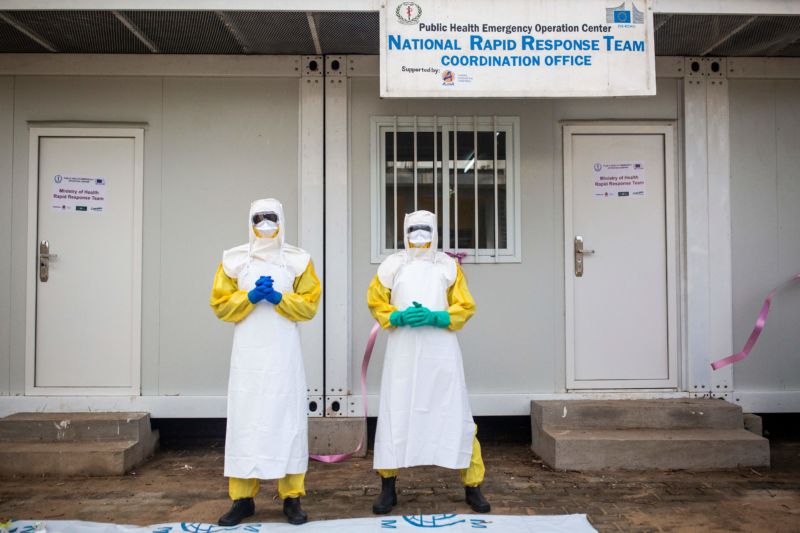
The Food and Drug Administration on Tuesday issued the first-ever approval for a therapy against Ebola virus disease.
Though the Ebola vaccine, Ervebo, earned approval late last year and proved 97.5 percent effective in preliminary trials, the newly approved therapy may be useful in addressing an ongoing outbreak in Democratic Republic of Congo, which began in June. The FDA’s approval may also boost the outlook for similar therapies being developed for COVID-19, which may become available before a vaccine.
The newly approved Ebola treatment, called Inmazeb (aka REGN-EB3), is a combination of three monoclonal antibodies made by Regeneron Pharmaceuticals. The antibodies target the only protein on the outside of Ebola virus particles, the glycoprotein. Ebola uses its glycoprotein to attach to and enter human cells, sparking infection. The cocktail of antibodies glom on to the protein, keeping it from invading cells.
Ebola outbreaks
In a 2018-2019 clinical trial amid an Ebola outbreak in the North Kivu and Ituri provinces of the DRC, Inmazeb outperformed three other treatments being tested side by side. Of 154 Ebola patients given Inmazeb, 33.8 percent died after 28 days, compared with 51 percent of 153 patients who received a different experimental antibody. Untreated, Ebola has an average fatality rate of around 50 percent, though fatality rates can vary widely between outbreaks, from 25 percent to 90 percent.
Ebola has caused 11 outbreaks since it was first identified in the DRC in 1976. The 11th outbreak began June 1 of this year in the Mbandaka area of Équateur Province and is ongoing. So far, over 100 people have been infected, causing at least 47 deaths. The 10th outbreak that began August 1, 2018 in the North Kivu Province was declared over on June 25, 2020 after the outbreak infected 3,470 people, killing 2,287 (a 65 percent fatality rate). The largest Ebola outbreak recorded was the 2014 West African outbreak, which led to more than 28,000 cases and 11,000 deaths.
“We are incredibly proud that the FDA has approved Inmazeb,” George Yancopoulos, Regeneron’s president and chief scientific officer, said in a press release. He noted that Ebola has “caused a number of deadly outbreaks.”
COVID-19 therapies
But the approval comes as Regeneron is in the spotlight for a different monoclonal antibody cocktail—one that targets the pandemic coronavirus, SARS-CoV-2, which causes COVID-19. The cocktail, which involves two monoclonal antibodies, is still in clinical trials but was notably given to US President Donald Trump on a “compassionate use” basis.
Rival pharmaceutical company Eli Lilly is also developing a COVID-19 antibody therapy, though the trial was recently paused for a safety evaluation.
Trump has touted the antibodies as a “cure” despite insufficient data to support the claim. The only publicly available data on the efficacy of Regeneron’s cocktail comes from a September 29 press release, which indicates that SARS-CoV-2 levels decrease more quickly in infected patients who were not hospitalized for their infection.
Nevertheless, Regeneron has requested that the FDA issue an Emergency Use Authorization for the use of the cocktail amid the pandemic, as has Lilly. The FDA’s approval of Regeneron’s Ebola antibody cocktail may bolster optimism that the FDA will issue EUAs.
“As we apply the same sophisticated technologies and manufacturing capabilities against COVID-19, we hope this will be one of many demonstrations of how the power of science can be successfully deployed against dangerous infectious diseases,” Yancopoulos said in the press release.
https://arstechnica.com/?p=1715073

